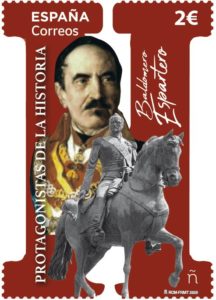History Professor Adrian Shubert’s Spanish book Espartero, El Pacificador (Galaxia Gutenberg, 2018), a biography about 19th century Spaniard Baldomero Espartero, has been cited in a special tribute to the leading Spanish figure.
On July 15, the Government of Spain issued a new postage stamp in Espartero’s honour. Shubert’s closing assessment of Espartero as “the embodiment of peace and the constitutional government” who did not get “the modest recognition of a postage stamp” was mentioned in the announcement that finally acknowledged Espartero with a Correos stamp.

“It is exciting to know that my book has been quoted. This is the kind of research impact, an unusual and gratifying kind, that I have made,” Shubert said.
Shubert’s book was published in 2018 and chronicles the life of Espartero from his humble beginnings in a lower-middle class village to becoming a top army general and, according to Shubert, the most important figure of Spain’s 19th century.
“He had a such an amazing life, it’s almost something out of a novel than real life,” Shubert said, adding, “his personality was unprecedented and, in the Spanish context, unmatched. He could be compared to American political figures George Washington and Ulysses S. Grant.”
Shubert explained highlights of Espartero’s life included volunteering for the Spanish army that fought against Napoleon, serving as Queen Isabella II’s commanding general during the country’s seven-year civil war and serving as regent (a stand in for the Monarch) for three years before being forced into exile by a military coup. In his later years, Espartero became Prime Minister of Spain and, towards the end of his life he was also offered the role of King, but declined.
An English edition of Shubert’s book, The Sword of Luchana: Baldomero Espartero and the Making of Modern Spain (1793-1879), will be published in 2021.
“For English readers, I hope the takeaway will be that his life made a fascinating and incredible story. It’s a book about him, but also a book about the national context in which he lived his life,” Shubert said.
